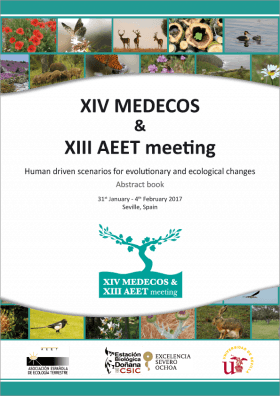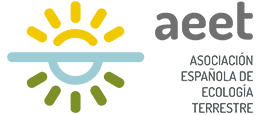MEDECOS XIV International Conference and XIII AEET Meeting, Sevilla, 2017

MEDECOS is an international conference organized by ISOMED, the International Society of Mediterranean Ecology, which aims to bring together the scientific community interested in Mediterranean-type ecosystems (MTEs).
The origins of MEDECOS date back to March 1971, when an international group of scientists convened in Valdivia, Chile, to discuss their work on Mediterranean-climate ecosystems. MEDECOS has been hosted every 3-4 years in different locations of the five Mediterranean areas of the world (Mediterranean Basin, SW Australia, California, Central Chile and the Cape Region in South Africa). In 2017, MEDECOS was held at the University of Seville, in the “Reina Mercedes” Science Campus, in Seville (Spain) simultaneously with the biennial meeting of the Spanish Association for Terrestrial Ecology (AEET). This meeting was co-organized and supported by the Spanish Association for Terrestrial Ecology, the Doñana Biological Station (EBD-CSIC) and the University of Seville (US).
The motto of this event was "Human driven scenarios for evolutionary and ecological changes". The main focus of the joint conference was the ecology and evolution of Mediterranean ecosystems and their species, from plants to animals and also microorganisms. By uniting scientists and students whose research focuses on MTEs, we expected to gain insights into the similarities and differences in how MTEs function, change and evolve.
The conference also hosted a regular AEET meeting, thus more general topics on any aspect of ecology will be also considered. The official language of the conference was English.
The list of themes addressed were: Comparative ecology and evolution; Historical biogeography of Mediterranean lineages; Current species conservation challenges; Biodiversity: species interactions, networks, communities and phylogenetics; Evolutionary and ecological drivers of MTEs as biodiversity hotspots; Ecophysiology and functional traits; Ecosystem functioning and services: challenges and risks in a changing world; Consequences of biotic and environmental global changes for MTEs.
4 Workshops on specific knowledges, skills, or on how to use some auxiliary technology tools were held, in order to improve research methods and to get started on the disclosure. A mentoring program was launched as a pilot exercise, in wich mentors (experienced researchers) will be paired with early career mentees based on their common research interestsearly career reserchers. The aim of this iniciative was to help students choose which talks to see, discuss about the talks seen during the conference, as well as more general advice on the scientific career, future options etc.
Three exciting field Trips were held:
- Doñana National Park: one of the largest and most diverse wintering waterfowl areas in Europe, and with an extremely well preserved mobile coastal dune vegetation.
- Alcornocales Natural Park around the Strait of Gibraltar region: a region dominated by extensive sclerophyllous cork-oak (Quercus suber), semideciduous oak (Q. canariensis) woodlands and heathlands, with singular endemic and Tertiary relict woody species.
- Ronda: an historical city founded by the Romans in a region full of Neolithic remains and played an important role during the Muslim period and the reconquest by the Catholic monarchs. Currently, it is a center of modern-style, ecologically-oriented vineyards and wineries.
This meeting had 538 participants from a great number of different countries. A total of 441 contributions were presented: 10 plenary talks, 16 main talks, 179 oral standard talks; 68 flash talks, and 168 posters, all collected in the book of abstracts of the meeting.
Download here the XIV MEDECOS & XIII AEET meeting ABSTRACT BOOK
Download here the XIV MEDECOS & XIII AEET meeting ABSTRACT BOOK


